2020 Summer Olympics
|
| |||
| Host city | Tokyo, Japan | ||
|---|---|---|---|
| Motto |
Discover Tomorrow (Japanese: | ||
| Nations | 207 (expected) | ||
| Athletes | 11,091 (expected) | ||
| Events | 339 in 33 sports (50 disciplines) | ||
| Opening | 24 July | ||
| Closing | 9 August | ||
| Stadium | New National Stadium | ||
| Summer | |||
| |||
| Winter | |||
| |||
| Part of a series on |
|
The 2020 Summer Olympics, officially known as the Games of the XXXII Olympiad (Japanese: 第三十二回オリンピック競技大会 Hepburn: Dai Sanjūni-kai Orinpikku Kyōgi Taikai)[1] and commonly known as Tokyo 2020, is a forthcoming international multi-sport event that is scheduled to take place from 24 July to 9 August 2020.
Tokyo was selected as the host city during the 125th IOC Session in Buenos Aires on 7 September 2013.[2] These Games will mark the return of the Summer Olympics to Tokyo for the first time since 1964, and the fourth Olympics overall to be held in Japan, following the 1972 Winter Olympics in Sapporo and the 1998 Winter Olympics in Nagano. They will be the second of three consecutive Olympic Games to be held in East Asia, following the 2018 Winter Olympics in Pyeongchang, South Korea, and preceding the 2022 Winter Olympics in Beijing, China.
These Games will see the introduction of additional disciplines within several of the Summer Olympics sports, including 3x3 basketball, freestyle BMX and Madison cycling, as well as further mixed events. Under new IOC policies that allow sports to be added to the Games' programme to augment the permanent "core" Olympic events, these Games will see karate, sport climbing, surfing and skateboarding make their Olympic debuts, and the return of baseball and softball (which were removed from the summer programme after 2008).
Bidding process
Tokyo, Istanbul, and Madrid were the three candidate cities. The applicant cities of Baku (Azerbaijan) and Doha (Qatar) were not promoted to candidate status. A bid from Rome was withdrawn.
Host city election
The IOC voted to select the host city of the 2020 Summer Olympics on 7 September 2013 at the 125th IOC Session at the Buenos Aires Hilton in Buenos Aires, Argentina. An exhaustive ballot system was used. No city won over 50% of the votes in the first round, and Madrid and Istanbul were tied for second place. A run-off vote between these two cities was held to determine which would be eliminated. In the final vote, a head-to-head contest between Tokyo and Istanbul, Tokyo was selected by 60 votes to 36, as it got at least 49 votes needed for a majority.
| 2020 Summer Olympics host city election[3] | |||||
|---|---|---|---|---|---|
| City | NOC name | Round 1 | Runoff | Round 2 | |
| Tokyo | 42 | — | 60 | ||
| Istanbul | 26 | 49 | 36 | ||
| Madrid | 26 | 45 | — | ||
Development and preparation
The Tokyo metropolitan government set aside a fund of 400 billion Japanese yen (over 3.67 billion USD) to cover the cost of hosting the Games. The Japanese government is considering increasing slot capacity at both Haneda Airport and Narita International Airport by easing airspace restrictions. A new railway line is planned to link both airports through an expansion of Tokyo Station, cutting travel time from Tokyo Station to Haneda from 30 minutes to 18 minutes, and from Tokyo Station to Narita from 55 minutes to 36 minutes; the line would cost 400 billion yen and would be funded primarily by private investors. But East Japan Railway Company (East JR) is planning a new route near Tamachi to Haneda Airport.[4] Funding is also planned to accelerate completion of the Central Circular Route, Tokyo Gaikan Expressway and Ken-Ō Expressway, and to refurbish other major expressways in the area.[5] There are also plans to extend the Yurikamome automated transit line from its existing terminal at Toyosu Station to a new terminal at Kachidoki Station, passing the site of the Olympic Village, although the Yurikamome would still not have adequate capacity to serve major events in the Odaiba area on its own.[6]
The Organizing Committee is headed by former Prime Minister Yoshirō Mori.[7] Olympic and Paralympic Minister Yoshitaka Sakurada is overseeing the preparations on behalf of the Japanese government.[8]
Japan has traditionally used Olympic events to showcase new technology. Telecom company NTT DoCoMo signed a deal with Finland's Nokia to provide 5G-ready baseband networks in Japan in time for the Olympics.[9][10]
Venues and infrastructure
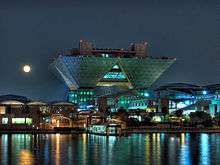
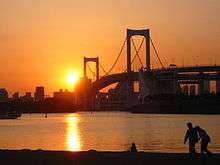
It was confirmed in February 2012 that the Olympic Stadium in Tokyo would be demolished and reconstructed, and receive a £1 billion upgrade for the 2019 Rugby World Cup as well as the 2020 Olympics.[11] As a result, a design competition for the new stadium was launched. In November 2012, the Japan Sport Council announced that out of 46 finalists, Zaha Hadid Architects was awarded the design for the new stadium. Plans included dismantling the original stadium, and expanding the capacity from 50,000 to a modern Olympic capacity of about 80,000.[12] However, Japanese Prime Minister Shinzō Abe announced in July 2015 that plans to build the New National Stadium would be scrapped and rebid on amid public discontent over the stadium's building costs. In Autumn 2015 a new design by Kengo Kuma was approved as winning project of new stadium design competition which decreased the capacity to between 60,000–80,000 depending by event[13]
Twenty-eight of the thirty-three competition venues in Tokyo are within 8 kilometres (4.97 miles) of the Olympic Village. Eleven new venues are to be constructed.[14]
It was reported in September 2016 that a review panel said that the cost of hosting the Olympics and Paralympics could quadruple from the original estimate, and therefore proposed a major overhaul to the current plan to reduce costs, including moving venues outside Tokyo.[15]
In October,2018 Japanese government announced that the costs of building facilities for the 2020 Olympic games would be as much as $25 billion or even more.[16]
Heritage Zone
Seven venues for nine sports will be located within the central business area of Tokyo, northwest of the Olympic Village. Several of these venues were also used for the 1964 Summer Olympics.
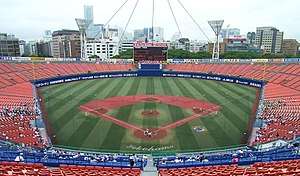
| Venue | Events | Capacity | Status |
|---|---|---|---|
| Olympic Stadium | Opening and closing ceremonies | 60,102 | Under construction |
| Athletics | |||
| Football (women's final 7 August) | |||
| Yoyogi National Gymnasium | Handball | 13,291 | Existing |
| Ryōgoku Kokugikan | Boxing | 11,098 | Existing |
| Tokyo Metropolitan Gymnasium | Table tennis | 10,000 | Existing |
| Nippon Budokan | Judo | 14,471 | Existing |
| Karate | |||
| Tokyo International Forum | Weightlifting | 5,012 | Existing |
| Imperial Palace Garden | Athletics (marathon, race walk) | 5,000 seated, unlimited standing room along route | Temporary |
| Musashinonomori Park[17] | Road cycling (start road races) | Temporary |
Tokyo Bay Zone
13 venues for 15 sports will be located in the vicinity of Tokyo Bay, southeast of the Olympic Village, predominantly on Ariake, Odaiba and the surrounding artificial islands.
| Venue | Events | Capacity | Status |
|---|---|---|---|
| Kasai Rinkai Park | Canoeing (slalom) | 8,000 | Under construction |
| Oi Seaside Park | Field hockey | 15,000 | Under construction[18] |
| Olympic Aquatics Centre | Aquatics (swimming, diving, synchronized swimming) | 15,000 | Under construction |
| Tokyo Tatsumi International Swimming Center | Water polo[19] | 3,635 | Existing |
| Yumenoshima Park | Archery | 7,000 | Under construction[20] |
| Ariake Arena | Volleyball | 15,000 | Under construction |
| Olympic BMX Course | BMX cycling | 6,000 | Under construction |
| Skateboarding | |||
| Olympic Gymnastic Centre | Gymnastics (artistic, rhythmic, trampoline) | 12,000 | Temporary |
| Ariake Coliseum | Tennis | 20,000 (10,000 centre court; 5,000 court 1, 3,000 court 2, 8x250 match courts) | Existing, Renovated |
| Odaiba Marine Park | Triathlon | 5,000 seated, unlimited standing room along route | Existing with temporary stands |
| Aquatics (marathon swimming) | |||
| Shiokaze Park | Beach volleyball | 12,000 | Temporary |
| Central Breakwater | Equestrian (eventing) | 20,000 | Existing with temporary infrastructure |
| Rowing | |||
| Canoeing (sprint) | |||
| Aomi Urban Sports Venue | 3x3 basketball | 5,000 | Temporary |
| Sport climbing |
Outlying Venues
Twelve venues for 16 sports will be situated farther than 8 kilometres (5 mi) from the Olympic Village.
| Venue | Events | Capacity | Status |
|---|---|---|---|
| Camp Asaka | Shooting | Existing, renovated | |
| Musashino Forest Sports Plaza | Modern pentathlon (fencing) | 10,000 | Ready, built for the games |
| Badminton[21] | |||
| Ajinomoto Stadium | Football | 49,970[22] | Existing |
| Modern pentathlon (excluding fencing) | |||
| Rugby sevens | |||
| Saitama Super Arena | Basketball | 22,000[23] | Existing |
| Enoshima | Sailing | 10,000[24] | Existing with temporary stands |
| Surfing | |||
| Makuhari Messe | Fencing | 6,000 | Existing with temporary stands |
| Taekwondo | |||
| Wrestling | 8,000[25] | ||
| Baji Koen | Equestrian (dressage, jumping)[26] | Existing with temporary stands | |
| Kasumigaseki Country Club | Golf | 30,000[27][28] | Existing with temporary stands |
| Izu Velodrome | Track cycling | 5,000[29] | Existing, expanded |
| Izu Mountain Bike Course | Mountain biking[30] | ||
| Yokohama Stadium | Baseball | 30,000[31] | Existing |
| Softball | |||
| Fukushima Azuma Baseball Stadium | Baseball (opening match) | 30,000 | Existing, renovated |
| Softball (opening match) [32] | |||
| Fuji International Speedway | Road cycling (finish road races and time trial) |
Existing |
Football venues
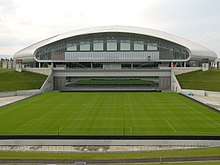
- International Stadium Yokohama, Yokohama; 70,000 (M/W preliminaries, women's quarterfinal and semifinal, men's quarterfinal and final, 10 matches)
- Saitama Stadium, Saitama; 62,000 (M/W preliminaries and quarterfinal, semifinal and 3rd place, 11 matches)
- Miyagi Stadium, Sendai; 48,000 (M/W preliminaries and quarterfinal, 10 matches)
- Tokyo Stadium; 49,000 (M/W opening round of preliminaries only, 4 matches)
- Kashima Soccer Stadium, Ibaraki; 42,000 (M/W preliminaries and M/W quarterfinal, semifinal, women's 3rd place, 10 matches)
- Sapporo Dome, Sapporo; 42,000 (M/W preliminaries, 10 matches)
- National Stadium, Tokyo; 60,000 (women's final only, FIFA could want to move this match to same venue than men's final in Yokohama)
Non-competition venues
| Venue | Events |
|---|---|
| Imperial Hotel, Tokyo | IOC |
| Harumi Futo | Olympic Village |
| Tokyo Big Sight | Media Press Center |
| International Broadcast Center |
Tickets
The opening ceremony tickets will range from 12,000 to 300,000 yen, with a maximum price of 130,000 yen for the finals of athletics.[34] The average price of all the Olympic tickets is 7,700 yen. 50% of the tickets will be sold for 8,000 yen or less. A symbolic ticket price of 2,020 yen will be for families, groups resident in Japan and in conjunction with a school programme. Tickets will be sold through 40,000 shops in Japan and by mail order to Japanese addresses through the Internet.[35] International guests will need to visit Japan during the sales period or arrange for tickets through a third party, such as a travel agent.[36]
The Games
Sports
The official programme for the 2020 Summer Olympics was approved by the IOC executive board on 9 June 2017. The president of the IOC, Thomas Bach, stated that the goal for the Tokyo Games was to make them "more youthful, more urban" and to "include more women".[37][38]
The games will feature 339 events in 33 different sports, encompassing 50 disciplines. Alongside the five new sports that will be introduced in Tokyo, there will be fifteen new events within existing sports, including 3-on-3 basketball, freestyle BMX and Madison cycling, and new mixed events in several sports.
In the list below, the number of events in each discipline is noted in parentheses.
- Aquatics
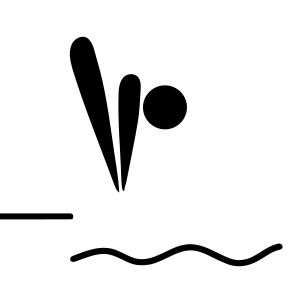

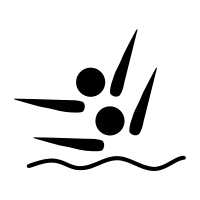
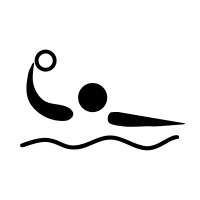
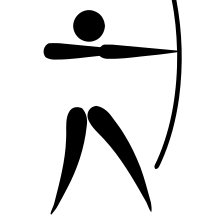
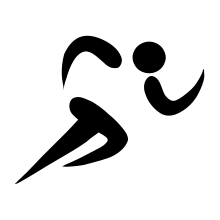
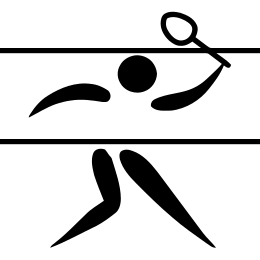
- Baseball/Softball
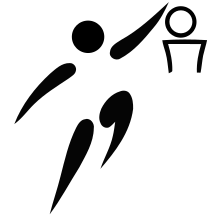
- Basketball (2)
- 3x3 basketball (2)
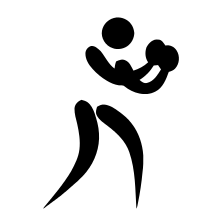
_pictogram.svg.png)
- Slalom (4)
- Sprint (12)
_pictogram.svg.png)
- BMX freestyle (2)
- BMX racing (2)
- Mountain biking (2)
- Road cycling (4)
- Track cycling (12)
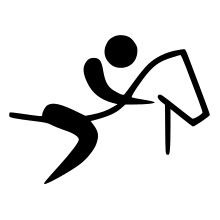
- Dressage (2)
- Eventing (2)
- Jumping (2)
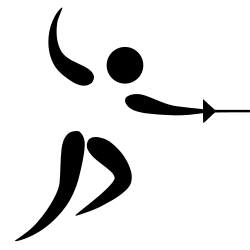
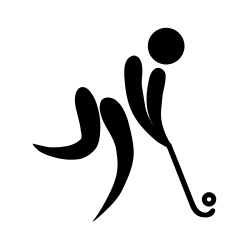
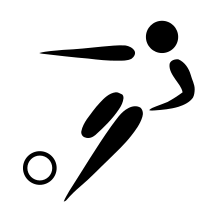
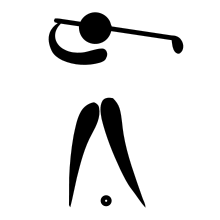
_pictogram.svg.png)
- Artistic (14)
- Rhythmic (2)
- Trampoline (2)
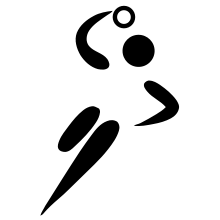


- Kata (2)
- Kumite (6)
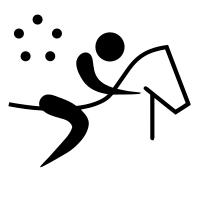

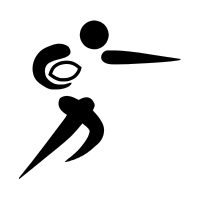

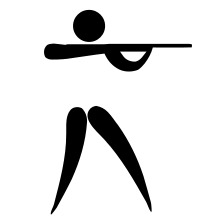




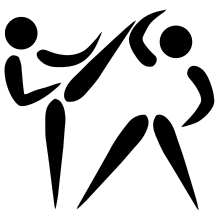
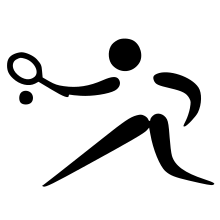

_pictogram.svg.png)
- Volleyball (2)
- Beach volleyball (2)

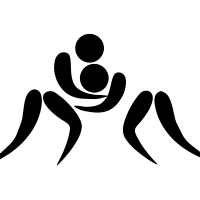
- Freestyle (12)
- Greco-Roman (6)
New sports
As part of a goal to control costs and ensure that the Olympics remain "relevant to sports fans of all generations", the IOC assessed the 26 sports contested at the 2012 Olympics, with the remit of dropping one sport and thus retaining 25 "core" sports to join new entrants golf and rugby sevens at the 2020 Games. This move would bring the total number of sports to 27, one less than the requirement of 28 for the 2020 Olympics programme, thus leaving a single vacancy which the IOC would seek to fill from a shortlist containing seven unrepresented sports as well as the sport that had been dropped from the 2012 Olympics programme.
On 12 February 2013, IOC leaders voted to drop wrestling from the "core" programme for the 2020 Games; this was a surprising decision considering that wrestling is one of the oldest Olympic sports, having been included since the ancient Olympic Games and included in the original programme for the modern Games. The New York Times felt that the decision was based on the shortage of well-known talent and the absence of women's events in the sport.[39][40][41] Wrestling was duly added to the shortlist of applicants for inclusion in the 2020 Games, alongside the seven new sports that were put forward for consideration.
On 29 May 2013, it was announced that three sports had made the final shortlist: baseball/softball, squash and wrestling.[42] The other five sports were excluded from consideration at this point: karate, roller sports, sport climbing, wakeboarding, and wushu.[43] On 8 September 2013, at the 125th IOC Session, the IOC selected wrestling to be included in the Olympic programme for 2020 and 2024. Wrestling secured 49 votes, while baseball/softball and squash received 24 votes and 22 votes respectively.[44]
Under new IOC policies that shift the Games to an "event-based" programme rather than sport-based, the host organizing committee can now also propose the addition of sports to the programme. This rule is designed so that sports popular in the host country can be added to the programme to improve local interest.[45] As a result of these changes, a new shortlist of eight sports was unveiled on 22 June 2015, consisting of baseball/softball, bowling, karate, roller sports, sport climbing, squash, surfing, and wushu.[46] On 28 September 2015, organisers submitted their shortlist of five proposed sports to the IOC: baseball/softball, karate, sport climbing, surfing, and skateboarding.[47] The five proposed sports were approved on 3 August 2016 by the IOC during the 129th IOC Session in Rio de Janeiro, Brazil, and will be included in the sports programme for 2020 only, bringing the total number of sports at the 2020 Olympics to 33.[48][49]
Participating Countries



.svg.png)





















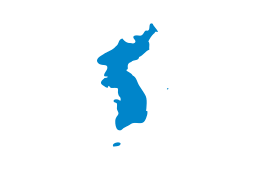
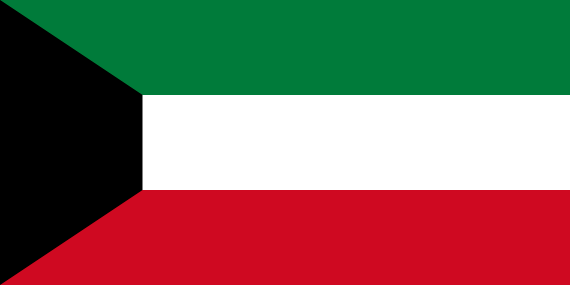
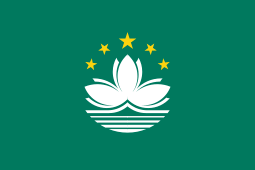

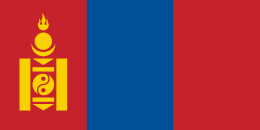

















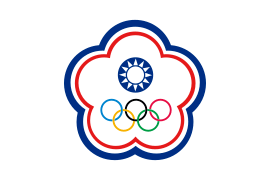




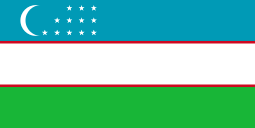

Calendar
The 2020 schedule by session was approved by the IOC Executive Board on 18 July 2018, with the exception of swimming, diving, and synchronized swimming. A more detailed schedule by event is expected to be available in the spring of 2019.[50][51]
- All times and dates use Japan Standard Time (UTC+9)
| OC | Opening ceremony | ● | Event competitions | 1 | Gold medal events | CC | Closing ceremony |
| July/August | 22 Wed |
23 Thu |
24 Fri |
25 Sat |
26 Sun |
27 Mon |
28 Tue |
29 Wed |
30 Thu |
31 Fri |
1 Sat |
2 Sun |
3 Mon |
4 Tue |
5 Wed |
6 Thu |
7 Fri |
8 Sat |
9 Sun |
Events | |
|---|---|---|---|---|---|---|---|---|---|---|---|---|---|---|---|---|---|---|---|---|---|
| OC | CC | N/A | |||||||||||||||||||
| ● | 1 | 1 | 1 | ● | ● | ● | 1 | 1 | 5 | ||||||||||||
| ● | ● | ● | ● | ● | ● | ● | ● | ● | 1 | 48 | |||||||||||
| ● | ● | ● | ● | ● | ● | ● | ● | ● | ● | 5 | |||||||||||
| ● | ● | ● | ● | ● | ● | ● | ● | ● | 1 | 1 | |||||||||||
| Basketball | ● | ● | ● | ● | ● | ● | ● | ● | ● | ● | ● | ● | ● | 1 | 1 | 4 | |||||
| ● | ● | ● | ● | 2 | |||||||||||||||||
| ● | ● | ● | ● | ● | ● | ● | ● | ● | ● | ● | ● | ● | ● | ● | 13 | ||||||
| Canoeing | ● | 1 | 1 | ● | 1 | 1 | 16 | ||||||||||||||
| ● | 4 | ● | 4 | ● | 4 | ||||||||||||||||
| Cycling | 1 | 1 | 2 | 22 | |||||||||||||||||
| ● | ● | ● | ● | ● | ● | ● | |||||||||||||||
| ● | 2 | ● | 2 | ||||||||||||||||||
| 1 | 1 | ||||||||||||||||||||
| 1 | 1 | 1 | 1 | ● | ● | 1 | ● | 1 | ● | 1 | ● | 1 | 8 | ||||||||
| ● | ● | 1 | 1 | ● | ● | ● | 2 | ● | 1 | ● | 1 | 6 | |||||||||
| ● | ● | ● | ● | ● | ● | ● | ● | ● | 12 | ||||||||||||
| ● | ● | ● | ● | ● | ● | ● | ● | ● | ● | ● | ● | 1 | 1 | 2 | |||||||
| ● | ● | ● | ● | ● | ● | ● | ● | ● | ● | ● | 1 | 1 | 2 | ||||||||
| ● | ● | ● | 1 | ● | ● | ● | 1 | 2 | |||||||||||||
| Gymnastics | ● | ● | 1 | 1 | 1 | 1 | ● | ● | ● | 18 | |||||||||||
| ● | 1 | 1 | |||||||||||||||||||
| 1 | 1 | ||||||||||||||||||||
| ● | ● | ● | ● | ● | ● | ● | ● | ● | ● | ● | ● | ● | ● | 1 | 1 | 2 | |||||
| ● | ● | ● | ● | ● | ● | ● | ● | 15 | |||||||||||||
| ● | ● | ● | 8 | ||||||||||||||||||
| ● | 1 | 1 | 2 | ||||||||||||||||||
| ● | ● | ● | ● | ● | ● | ● | ● | 14 | |||||||||||||
| ● | ● | 1 | ● | ● | 1 | 2 | |||||||||||||||
| ● | ● | ● | ● | ● | ● | ● | ● | ● | ● | ● | 10 | ||||||||||
| ● | ● | ● | ● | ● | ● | ● | ● | ● | ● | 15 | |||||||||||
| 1 | 1 | 1 | 1 | 4 | |||||||||||||||||
| ● | ● | ● | ● | ● | 1 | 1 | |||||||||||||||
| ● | ● | 1 | 1 | 2 | |||||||||||||||||
| ● | ● | ● | 2 | 2 | |||||||||||||||||
| ● | 4 | 4 | 4 | 5 | 5 | 4 | 4 | 5 | 1 | 1 | 37 | ||||||||||
| ● | ● | 1 | ● | 1 | 2 | ||||||||||||||||
| ● | ● | 1 | ● | ● | 1 | 1 | ● | ● | ● | ● | 1 | 1 | 5 | ||||||||
| 2 | 2 | 2 | 2 | 8 | |||||||||||||||||
| ● | ● | ● | ● | ● | ● | 1 | 1 | 3 | 5 | ||||||||||||
| 1 | 1 | 1 | 3 | ||||||||||||||||||
| Volleyball | ● | ● | ● | ● | ● | ● | ● | ● | ● | ● | ● | ● | ● | 1 | 1 | 4 | |||||
| ● | ● | ● | ● | ● | ● | ● | ● | ● | ● | ● | ● | ● | ● | 1 | 1 | ||||||
| ● | ● | ● | ● | ● | ● | ● | ● | ● | ● | ● | ● | ● | ● | 1 | 1 | 2 | |||||
| ● | ● | ● | ● | ● | ● | ● | ● | ● | ● | 14 | |||||||||||
| ● | ● | ● | ● | ● | ● | ● | 18 | ||||||||||||||
| Daily medal events | 339 | ||||||||||||||||||||
| Cumulative total | 339 | ||||||||||||||||||||
| July/August | 22 Wed |
23 Thu |
24 Fri |
25 Sat |
26 Sun |
27 Mon |
28 Tue |
29 Wed |
30 Thu |
31 Fri |
1 Sat |
2 Sun |
3 Mon |
4 Tue |
5 Wed |
6 Thu |
7 Fri |
8 Sat |
9 Sun |
Total events | |
Event scheduling
Per the historical precedent of swimming at the 2008 Summer Olympics in Beijing and figure skating at the 2018 Winter Olympics in Pyeongchang, swimming finals will be held in the morning to allow live primetime broadcasts in the Americas (such as NBC). Japanese broadcasters were said to have criticized the decision, as swimming is one of the most popular Olympic events in the country.[52][53]
Marketing
Emblem
The official emblems for the 2020 Olympics and Paralympics were unveiled on 25 April 2016; designed by Asao Tokolo, who won a nationwide design contest,[54] it takes the form of a ring in an indigo-coloured checkerboard pattern. The design is meant to "express a refined elegance and sophistication that exemplifies Japan".[55] The designs replaced a previous emblem which had been scrapped due to allegations that it plagiarized the logo of a Belgian theatre.[56]
Mascot
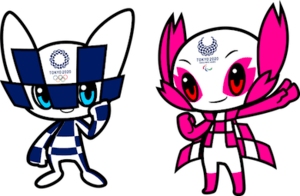
The Tokyo 2020 Organising Committee began accepting submissions for the official mascots of the Games from 1 to 14 August 2017. A total of 2,042 entries were received.[57] Three shortlisted entries were unveiled at the Kakezuka Elementary School on 7 December 2017. A poll was then conducted between 11 December 2017 and 22 February 2018 to choose the winning entry, with each participating elementary school class allocated one vote.[58][59] The results were announced on 28 February 2018. The winning entry was candidate pair A, created by Ryo Taniguchi, which received 109,041 votes, followed by Kana Yano's pair B with 61,423 votes and Sanae Akimoto's pair C with 35,291 votes. Miraitowa is a figure with blue checkered patterns inspired by the Games' official logo, which has old-fashioned charm and new innovation combined with a special power of instant teleportation. Both Miraitowa and Someity were named by the Organising Committee on 22 July 2018.[60]
Video games
Sega will hold the rights to develop video games based on the 2020 Summer Olympics.[61]
Theme Song
The Korean singer Taeyeon, american dj Frankie Knuckles and Japanese Singer Misia will song Victory of Nations.
Sponsors
As of 2015 total sponsorship for the 2020 Games reached approximately $1.3 billion, setting an Olympics record (the 2008 Summer Olympics in Beijing attracted $1.2 billion).[62]
Concerns and controversies
IAAF bribery claims
In January 2016, the second part of a World Anti-Doping Agency commission report into corruption included a footnote detailing a conversation between Khalil Diack, son of former International Association of Athletics Federations (IAAF) president Lamine Diack, and Turkish officials heading up the Istanbul bid team.[63] A transcript of the conversation cited in the report suggested that a "sponsorship" payment of between US$4 million and 5 million had been made by the Japanese bid team "either to the Diamond League or IAAF".[63] The footnote claimed that because Istanbul did not make such a payment, the bid lost the support of Lamine Diack. The WADA declined to investigate the claims because it was, according to its independent commission, outside the agency's remit.[63]
In July and October 2013 (prior to and after being awarded the Games), Tokyo made two bank payments totalling SG$2.8 million to a Singapore-based company known as Black Tidings. The company is tied to Papa Massata Diack, a son of Lamine Diack who worked as a marketing consultant for the IAAF, and is being pursued by French authorities under allegations of bribery, corruption, and money laundering.[64] Black Tidings is held by Ian Tan Tong Han, a consultant to Athletics Management and Services—which manages the IAAF's commercial rights, and has business relationships with Japanese firm Dentsu. Black Tidings has also been connected to a doping scandal involving the Russian athletics team.[64][65][66]
Japanese Olympic Committee and Tokyo 2020 board member Tsunekazu Takeda stated that the payments were for consulting services, but refused to discuss the matter further because it was confidential. Toshiaki Endo called on Takeda to publicly discuss the matter. Massata denied that he had received any money from Tokyo's organizing committee.[64][66] The IOC established a team to investigate these matters, and will closely follow the French investigation.[67]
Logo plagiarism
The initial design for the official emblems of the 2020 Summer Olympics and Paralympics were unveiled on 24 July 2015. The logo resembled a stylized "T"; a red circle in the top-right corner represented a beating heart, the flag of Japan, and an "inclusive world in which everyone accepts each other", and a dark grey column in the centre represented diversity.[68] The Paralympic emblem was an inverted version of the pattern made to resemble an equal sign.[69]
Shortly after the unveiling, Belgian graphics designer Olivier Debie accused the organizing committee of plagiarizing a logo he had designed for the Théâtre de Liège, which aside from the circle, consisted of nearly identical shapes. Tokyo's organizing committee denied that the emblem design was plagiarized, arguing that the design had gone through "long, extensive and international" intellectual property examinations before it was cleared for use.[70][71] Debie filed a lawsuit against the IOC to prevent use of the infringing logo.[56]
The emblem's designer, Kenjirō Sano, defended the design, stating that he had never seen the Liège logo, while TOCOG released an early sketch of the design that emphasized a stylized "T" and did not resemble the Liège logo.[56] However, Sano was found to have had a history of plagiarism, with others alleging his early design plagiarized work of Jan Tschichold, that he used a photo without permission in promotional materials for the emblem, along with other past cases. On 1 September 2015, following an emergency meeting of TOCOG, Governor of Tokyo Yōichi Masuzoe announced that they had decided to scrap Sano's two logos. The committee met on 2 September 2015 to decide how to approach another new logo design.[56]
On 24 November 2015, an Emblems Selection Committee was established to organize an open call for design proposals, open to Japanese residents over the age of 18, with a deadline set for 7 December 2015. The winner would receive ¥1 million and tickets to the opening ceremonies of both the 2020 Summer Olympics and Paralympics.[54][72][73] On 8 April 2016, a new shortlist of four pairs of designs for the Olympics and Paralympics were unveiled by the Emblems Selection Committee; the Committee's selection—with influence from a public poll, was presented to TOCOG on 25 April 2016 for final approval.[72]
Broadcasting
Sony and Panasonic are partnering with NHK to develop broadcasting standards for 8K resolution television, with a goal to release 8K television sets in time for the 2020 Olympics.[74][75]
In the United States, the 2020 Summer Olympics will be broadcast by NBCUniversal properties, as part of a US$4.38 billion agreement that began at the 2014 Winter Olympics in Sochi.[76]
In Europe, this will be the first Summer Olympics under the IOC's exclusive pan-European rights deal with Discovery Communications, which began at the 2018 Winter Olympics and run through 2024. The rights for the 2020 Games cover almost all of Europe, excluding France due to an existing rights deal that will expire following these Games, and Russia due to a pre-existing deal with a marketer through 2024.[77] Discovery will sub-license coverage to free-to-air networks in each territory. In the United Kingdom, these will be the last Games whose rights are fully owned by the BBC, although as a condition of a sub-licensing agreement that will carry into the 2022 and 2024 Games, Discovery holds exclusive pay television rights to these Games.[78][79][80]
References
- ↑ (French: Jeux de la XXXIIème olympiade)
- ↑ "Olympics 2020: Tokyo wins race to host Games". BBC Sport. 7 September 2013.
- ↑ "2020 Olympics Vote Total Box". Associated Press. Miami Herald. 7 September 2013. Retrieved 8 September 2013.
- ↑ JR東日本、東京五輪を前に都心部と羽田空港結ぶ新路線整備を on YouTube
- ↑ "羽田・成田発着を拡大、五輪へインフラ整備急ぐ". 日本経済新聞. 10 September 2013. Retrieved 10 September 2013.
- ↑ "五輪で東京に1000万人 過密都市ゆえの課題多く". 日本経済新聞. 10 September 2013. Retrieved 10 September 2013.
- ↑ PST (24 January 2014). "Mori heads Tokyo 2020 organizing committee". Sports.yahoo.com. Retrieved 4 February 2014.
- ↑ "List of Ministers (The Cabinet) | Prime Minister of Japan and His Cabinet". japan.kantei.go.jp. Retrieved 5 October 2018.
- ↑ "Nokia, NTT DoCoMo prepare for 5G ahead of Tokyo Olympics launch". 2 March 2015 – via Reuters.
- ↑ "Nokia wins 5G business with Japan's NTT DoCoMo - FierceWireless". www.fiercewireless.com.
- ↑ Himmer, Alastair (5 February 2012). "Rugby-Tokyo stadium set for billion dollar facelift". Reuters. Retrieved 17 September 2017.
- ↑ "Notice". Archived from the original on 19 April 2013.
- ↑ Himmer, Alastair (17 July 2015). "Japan rips up 2020 Olympic stadium plans to start anew". news.yahoo.com. AFP. Retrieved 17 July 2015.
- ↑ "Tokyo 2020 candidature file – section 8 – Sports and Venues" (PDF). Tokyo 2020. Archived from the original (PDF) on 5 April 2013. Retrieved 10 September 2013.
- ↑ "Tokyo panel: Olympic cost could expand fourfold". NHK. 29 September 2016. Archived from the original on 1 October 2016. Retrieved 30 September 2016.
- ↑ SPORTSTokyo Olympics: Costs hit almost $25 billion _ may go higher
- ↑
- ↑ "Seaside Park Hockey Stadium". Bureau of Olympic and Paralympic Games Tokyo 2020 Preparation. Retrieved 17 September 2018.
- ↑ Originally to be held at Water Polo Arena in Koto, Tokyo; venue moved in June 2015. "東京五輪、26競技の会場決定 自転車・サッカー除き". Nihon Keizai Shimbun. 9 June 2015. Retrieved 9 June 2015.
- ↑ "Dream Island Archery Field". Bureau of Olympic and Paralympic Games Tokyo 2020 Preparation. Retrieved 17 September 2018.
- ↑ Badminton originally to be held at Youth Plaza Arena; venue moved in June 2015. "東京五輪、26競技の会場決定 自転車・サッカー除き". Nihon Keizai Shimbun. 9 June 2015. Retrieved 9 June 2015.
- ↑ Rugby sevens originally to be held at National Olympic Stadium; venue moved in June 2015. "東京五輪、26競技の会場決定 自転車・サッカー除き". Nihon Keizai Shimbun. 9 June 2015. Retrieved 9 June 2015.
- ↑ Originally to be held at Youth Plaza Arena; proposal for venue change to Saitama Super Arena in late 2014 was confirmed in March 2015 by the IOC. "IOC supports Tokyo's plans to relocate Olympic venues". The Japan Times. 19 November 2014. Retrieved 10 June 2015. "Moving 2020 hoops to Saitama latest blow for game". The Japan Times. 3 March 2015. Retrieved 10 June 2015.
- ↑ Originally to be held at Wakasu Olympic Marina; venue moved in June 2015. "東京五輪、26競技の会場決定 自転車・サッカー除き". Nihon Keizai Shimbun. 9 June 2015. Retrieved 9 June 2015.
- ↑ All three events originally to be held at Tokyo Big Sight; venue moved in June 2015. "東京五輪、26競技の会場決定 自転車・サッカー除き". Nihon Keizai Shimbun. 9 June 2015. Retrieved 9 June 2015.
- ↑ "Change to Tokyo 2020 equestrian venue approved". inside.fei.org. 28 February 2015. Retrieved 16 August 2016.
- ↑ "Olympic Venues". ,
- ↑ Beall, Joel (20 March 2017). "2020 Olympic golf course changes policy, allows women full membership".
- ↑ Wilson, Stephen (10 December 2015). "IOC approves switch of cycling venues for Tokyo Olympics". japantoday.com. Retrieved 10 December 2015.
- ↑ "IOC approves switch of cycling venues for Tokyo Olympics". japantimes.co.jp. 9 December 2015. Retrieved 16 August 2016.
- ↑ "横浜スタジアム会場案…東京五輪に野球など追加".
- ↑ "Fukushima Prefecture to Host Tokyo 2020 Baseball & Softball Matches, Showcasing the Power of Sport to Support Recovery|The Tokyo Organising Committee of the Olympic and Paralympic Games". The Tokyo Organising Committee of the Olympic and Paralympic Games. Retrieved 2017-03-30.
- ↑ "Olympic sport football". tokyo2020.jp. 21 November 2016. Retrieved 21 November 2016.
- ↑
- ↑ "Tickets for Olympic Games / Tokyo Olympic Japan 2020".
- ↑ "How To Buy Tokyo Olympic Tickets". TrulyTokyo.
- ↑ "3-on-3 basketball officially added to Tokyo Olympics". CBC Sports. Retrieved 9 June 2017.
- ↑ "Tokyo 2020: Mixed-gender events added to Olympic Games". BBC Sport. Retrieved 9 June 2017.
- ↑ Hamilton, Tracee (2013-09-08). "Wrestling, IOC make right moves in getting sport back on 2020 Olympics program". Washington Post. ISSN 0190-8286. Retrieved 2018-03-16.
- ↑ Longman, Jeré (2013-02-12). "Olympics Moves to Drop Wrestling in 2020". The New York Times. ISSN 0362-4331. Retrieved 2018-03-16.
- ↑ "Wrestling to be dropped from 2020 Olympic Games". BBC Sport.
- ↑ IOC: Baseball/softball, squash and wrestling make cut for IOC Session vote in Buenos Aires
- ↑ "Wrestling, baseball/softball and squash shortlisted by IOC for 2020 as five fail to make cut".
- ↑ "Wrestling added to Olympic programme for 2020 and 2024 Games". IOC. 8 September 2013. Retrieved 8 September 2013.
- ↑ "Olympic Agenda 2020 Recommendations" (PDF). IOC. Retrieved 23 June 2015.
- ↑ "Baseball, softball among 8 sports proposed for 2020 Games". ESPN.com.
- ↑ "Olympics: Skateboarding & surfing among possible Tokyo 2020 sports". BBC Sport. Retrieved 29 March 2016.
- ↑ "IOC approves five new sports for Olympic Games Tokyo 2020". Olympic.org. 2016-08-03. Retrieved 2016-08-03.
- ↑ "You're in! Baseball/softball, 4 other sports make Tokyo cut". USA Today. 2016-08-03. Retrieved 2016-08-18.
- ↑ Tokyo 2020 Unveils Action-Packed Olympic Competition Schedule
- ↑ Olympic Competition Schedule
- ↑ "FINA back holding swimming finals in morning at Tokyo 2020 Olympics". Inside the Games. Retrieved 2018-07-25.
- ↑ "Tokyo 2020 swimming finals set for prime-time in United States as agreement reached to hold morning medal races". Inside the Games. Retrieved 2018-09-24.
- 1 2 "Tokyo 2020 Emblems Committee relax competition rules ahead of search for new logo". InsideTheGames.biz. Retrieved 26 October 2015.
- ↑ "Checkered pattern by artist Tokolo chosen as logo for 2020 Tokyo Olympics". Japan Times. Retrieved 25 April 2016.
- 1 2 3 4 "Tokyo 2020 Olympics logo scrapped after allegations of plagiarism". The Guardian. Retrieved 1 September 2015.
- ↑ "Tokyo 2020 Games Mascots". Retrieved 7 September 2017.
- ↑ "2020 Tokyo Olympic organizers begin soliciting mascot ideas". The Japan Times. 1 August 2017. Retrieved 7 September 2017.
- ↑ "Tokyo 2020 lets children choose mascots from 3 finalists". NBC Sports. 7 December 2017. Retrieved 17 February 2018.
- ↑ "10th Meeting of the Mascot Selection Panel" (Press release). Tokyo Organising Committee of the Olympic and Paralympic Games. 30 May 2018. Retrieved 30 May 2018.
- ↑ Makuch, Eddie (27 October 2016). "Sega Making Video Games for 2020 Summer Olympics". GameSpot. Retrieved 8 July 2018.
- ↑ Fukase, Atsuko (15 April 2015). "2020 Tokyo Olympics Attract Record Sponsorship". The Wall Street Journal Japan Real Time. Retrieved 16 April 2015.
- 1 2 3 "Tokyo Olympics 2020: French prosecutors probe '$2m payment'". BBC News. 12 May 2016. Retrieved 14 May 2016.
- 1 2 3 "Tokyo Olympics: Japan to 'fully cooperate' with suspicious payments inquiry". The Guardian. Retrieved 7 June 2016.
- ↑ "Life bans for three athletics figures over alleged doping cover-up". BBC Sport. Retrieved 7 June 2016.
- 1 2 "Tokyo 2020 Olympic bid leader refuses to reveal Black Tidings details". The Guardian. Retrieved 6 June 2016.
- ↑ "IOC concerned at suspect payments made by Tokyo 2020 bid team". The Guardian. Retrieved 7 June 2016.
- ↑ "Tokyo 2020 unveils official emblem with five years to go". Olympic.org. Retrieved 27 July 2015.
- ↑ "Tokyo 2020 launches emblems for the Olympic and Paralympic Games". IPC. Retrieved 28 July 2015.
- ↑ "Tokyo Olympic Games logo embroiled in plagiarism row". The Guardian. 30 July 2015. Retrieved 1 August 2015.
- ↑ "Tokyo Olympics emblem said to look similar to Belgian theater logo". The Japan Times. 30 July 2015. Retrieved 30 July 2015.
- 1 2 "Japan unveils final four candidates for Tokyo 2020 Olympics logo". Japan Times. 8 April 2016. Retrieved 11 April 2016.
- ↑ "Tokyo Games organizers decide to scrap Sano emblem". NHK World. 1 September 2015. Archived from the original on 4 September 2015. Retrieved 1 September 2015.
- ↑ Vincent, James (2016-08-26). "Sony and Panasonic target 8K TVs for 2020 Olympics". The Verge. Retrieved 2017-07-21.
- ↑ "Exclusive: Lost market share prompts Sony-Panasonic TV tech alliance". Nikkei Asian Review. Archived from the original on 29 April 2017. Retrieved 21 July 2017.
- ↑ McCarthy, Michael (7 June 2011). "NBC wins U.S. TV rights to four Olympic Games through 2020". USA Today.
- ↑ "Russian state broadcasters commit to PyeongChang coverage". Retrieved 2018-02-06.
- ↑ "Olympics coverage to remain on BBC after Discovery deal". The Guardian. Retrieved 7 June 2016.
- ↑ "Discovery Lands European Olympic Rights Through '24". Sports Business Journal. Retrieved 1 July 2015.
- ↑ "BBC dealt another blow after losing control of TV rights for Olympics". The Guardian. Retrieved 30 June 2015.
External links
| Wikimedia Commons has media related to 2020 Summer Olympics. |
| Wikivoyage has a travel guide for Tokyo Olympic and Paralympic Games 2020. |
| Preceded by Rio de Janeiro |
Summer Olympic Games Tokyo XXXII Olympiad (2020) |
Succeeded by Paris |


